
The Battle of Adwa was the climactic battle of the First Italo-Ethiopian War. Ethiopian army managed to defeat the heavily outnumbered invading Italian and Eritrean force led by Oreste Baratieri on March 1, 1896, near the town of Adwa. The decisive victory thwarted the campaign of the Kingdom of Italy to expand its colonial empire in the Horn of Africa. By the end of the 19th century, European powers had carved up almost all of Africa after the Berlin Conference; Ethiopia was among the few countries to still maintain their independence. Adwa became a pre-eminent symbol of pan-Africanism and secured Ethiopian sovereignty until the Second Italo-Ethiopian War forty years later.

The First Italo-Ethiopian War, also referred to as the First Italo-Abyssinian War, or simply in Italy as the Abyssinian War, was a war fought between Italy and Ethiopia from 1895 to 1896. It originated from the disputed Treaty of Wuchale, which the Italians claimed turned Ethiopia into an Italian protectorate. Full-scale war broke out in 1895, with Italian troops from Italian Eritrea achieving initial successes against Tigrayan warlords at Coatit, Senafe and Debra Ailà, until they were reinforced by a large Ethiopian army led by Emperor Menelik II. The Italian defeat came about after the Battle of Adwa, where the Ethiopian army dealt the outnumbered Italian soldiers and Eritrean askaris a decisive blow and forced their retreat back into Eritrea. The war concluded with the Treaty of Addis Ababa. Because this was one of the first decisive victories by African forces over a European colonial power, this war became a preeminent symbol of pan-Africanism and secured Ethiopia's sovereignty until the Second Italo-Ethiopian War of 1935–37.

Menelik II, baptised as Sahle Maryam was king of Shewa from 1866 to 1889 and Emperor of Ethiopia from 1889 to his death in 1913. At the height of his internal power and external prestige, the process of territorial expansion and creation of the modern empire-state was largely completed by 1898.

The Second Italo-Ethiopian War, also referred to as the Second Italo-Abyssinian War, was a war of aggression waged by Italy against Ethiopia, which lasted from October 1935 to February 1937. In Ethiopia it is often referred to simply as the Italian Invasion, and in Italy as the Ethiopian War. It is seen as an example of the expansionist policy that characterized the Axis powers and the ineffectiveness of the League of Nations before the outbreak of World War II.

RasMakonnen Wolde Mikael Wolde Melekot, or simply Ras Makonnen, also known as Abba Qagnew, was an Ethiopian royal from Shewa, a military leader, the governor of Harar, and the father of future Emperor Haile Selassie. Described by Nikolai Gumilev as “one of the greatest leaders of Abyssinia”, he served in the First Italo-Ethiopian War, playing a key role at the Battle of Adwa.

The Battle of Dogali was fought on 26 January 1887 between Italy and Ethiopia in Dogali near Massawa, in present-day Eritrea.
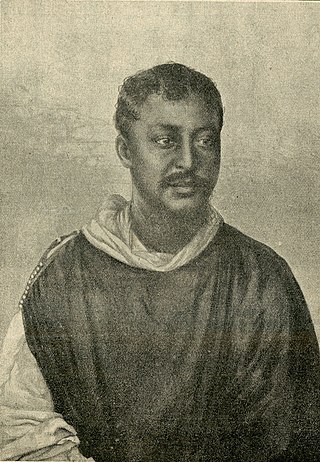
RasMengesha Yohannes was governor of Tigray and a son of Emperor Yohannes IV. His mother was Welette Tekle Haymanot wife of dejazmach Gugsa Mercha. Ras Araya Selassie Yohannes was his younger half brother. Prior to the Battle of Metemma, Mengesha Yohannes was considered to be a nephew of Emperor Yohannes IV. During the battle, the Emperor was mortally wounded and it was on his deathbed that Mengesha Yohannes was acknowledged as his "natural" son and designated as his heir. This created something of a succession problem.

Bahta Hagos, was Dejazmach of Akkele Guzay, and retrospectively considered an important leader of Eritrean resistance to foreign domination specifically against northern Ethiopian and Italian colonialism. He was born sometime between 1839 and 1850 into a rich peasant family in the town of Segheneyti and was killed in the Battle of Halai against the Italian Colonial Army on December 19, 1894. He was of the Tsena-Degle Tigrinyas, from Akele Guzay.

The Battle of Coatit was fought on 13 January 1895 between Italy and Ethiopian proxies led by Tigrayan Prince Ras Mengesha Yohannes in what is now Eritrea. It was the opening battle of the First Italo–Ethiopian War, and was a significant victory for the Italians, as they rebuffed an invasion force.

Giuseppe Galliano was an officer of the Royal Italian Army, mostly known for his role during the First Italo-Ethiopian War. He perished in the Battle of Adwa and was posthumously awarded the Gold Medal of Military Valour.
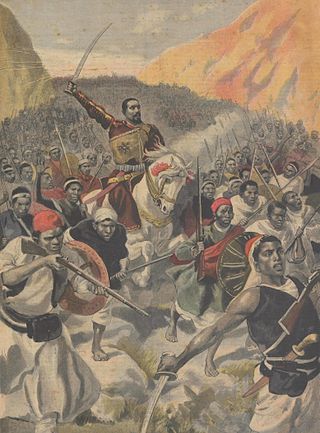
The Battle of Amba Alagi was the first in a series of battles between the Italian General Baratieri and Ethiopia's Emperor Menelik during the First Italo-Ethiopian War. Amba Alagi was one of Baratieri's forward positions; it was under the command of Major Toselli with 2,000 Eritrean Askari. On 7 December 1895, the Ras Makonnen, Fitawrari Gebeyehu and Ras Mengesha Yohannes commanded an assault of Menelik's vanguard that annihilated the Italians and killed Major Toselli.
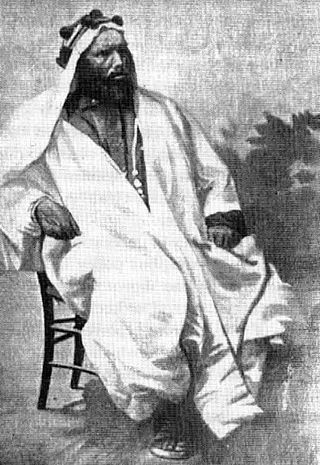
Ras Alula Engida was an Ethiopian general and politician who successfully led battles against Ottoman Egypt, the Mahdists and Italy. He was one of the most important leaders of the Abyssinian forces during the 19th century. Described by Haggai Erlich as the "greatest leader whom Ethiopia produced since the death of Emperor Tewodros II in 1868." Ras Alula was referred to by Europeans as "the Garibaldi of Ethiopia".
Medri Bahri or Mereb Melash, also known as Ma'ikele Bahr or Bahr Melash was a semi-autonomous province of the Ethiopian Empire located north of the Mareb River, in the Eritrean highlands (Kebassa) and some surrounding areas. Mereb Melash corresponds to the administrative territory ruled by the Bahr Negus in medieval times. Mereb Melash comprised the historical provinces of Hamasien and Seraye.

The Second Afar insurgency was an insurgency in the Afar Region of Ethiopia and the Southern Red Sea Region of Eritrea, waged by various Afar rebel groups. Both Ethiopia and Eritrea supported different rebel groups in the region in a proxy war, and occasionally engaged in border skirmishes with each other, as well as with opposing rebel groups.

The Eritrean–Ethiopian border conflict was a violent standoff and a proxy conflict between Eritrea and Ethiopia lasting from 1998 to 2018. It consisted of a series of incidents along the then-disputed border; including the Eritrean–Ethiopian War of 1998–2000 and the subsequent Second Afar insurgency. It included multiple clashes with numerous casualties, including the Battle of Tsorona in 2016. Ethiopia stated in 2018 that it would cede Badme to Eritrea. This led to the Eritrea–Ethiopia summit on 9 July 2018, where an agreement was signed which demarcated the border and agreed a resumption of diplomatic relations.

Giuseppe Edoardo Arimondi, OSML, OMS, OCI was an Italian general, mostly known for his role during the First Italo-Ethiopian War. He was one of the few European commanders who gained a victory over the Mahdists before Kitchener's Expedition, soundly defeating them at Agordat in 1893. After a long and successful colonial service, he died in combat at Adwa, and was posthumously awarded the Gold Medal of Military Valour.
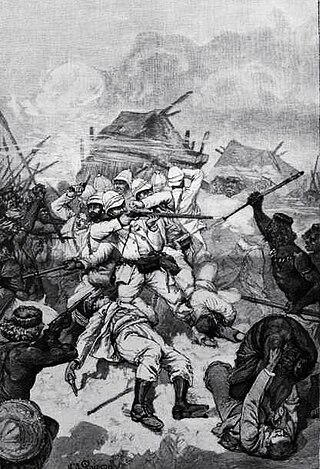
The Italo-Ethiopian War of 1887–1889 was an undeclared war between the Kingdom of Italy and the Ethiopian Empire occurring during the Italian colonization of Eritrea. The conflict ended with a treaty of friendship, which delimited the border between Ethiopia and Italian Eritrea but contained clauses whose different interpretations led to another Italo-Ethiopian war.

The Battle of Debra Ailà(Debre Ailat) took place during the First Italo-Ethiopian War on October 9, 1895, where under the combined efforts of Italian colonial troops and Askari troops defeated the rearguard of the Tigrayan army, which had withdrawn from Tigray's capital Mek'ele.
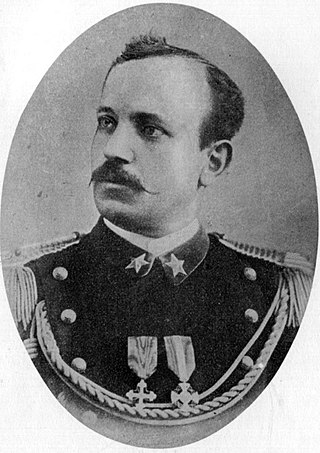
Pietro Toselli was a major of the Royal Italian Army. He is mainly known for his participation in the First Italo-Ethiopian War. He was born in Peveragno in 1856, the youngest of three siblings. His father was Giovanni Maria Toselli, and his mother Teresa (Botasso) Toselli. His older brother Enrico Toselli was a noted psychiatrist and university professor. Pietro Toselli joined the army at a young age and was commissioned second lieutenant of artillery in 1878. After finishing the tree year curriculum for artillerymen he opted for additional training in military engineering. After finishing his education in 1880 he became a first lieutenant. In 1887 he was promoted to captain. He first came to Africa in 1888 to carry out topographical work in the new colony of Italian Eritrea. Returning to Italy he published the book Pro Africa italica under the pseudonym "Un Eritreo". In 1894 he returned to Italian Eritrea to take command of the 4th Askari Battalion of the Corpo Speciale per L'Africa. He led Italian forces to victory at the Battle of Halai on the 18 December 1894, when his troops defeated the Eritrean forces of Batha Agos, who were besieging the Italian fort at Halai. On the 13 January 1895, he commanded the 4th Askari Battalion at the Battle of Coatit under the command of Oreste Baratieri. After the Ethiopian retreat Toselli, and the 4th Askari Battalion formed the Italian vanguard that caught up with the Ethiopian forces at the Battle of Senafe.
The Battle of Lake Ashenge, also called the Retreat of Lake Ashenge, was a skirmish that occurred during the Second Italo-Ethiopian War between the Italian army and the Ethiopian troops. The battle was not essentially a head-on clash between two armies, but rather a pursuit that the Italian troops carried out against the Imperial Army defeated in the previous Battle of Maychew. In this battle, the contribution of the Regia Aeronautica was decisive as it decimated the Ethiopian troops on the shores of Lake Ashenge, effectively causing the dissolution of the last army of the northern front.


















